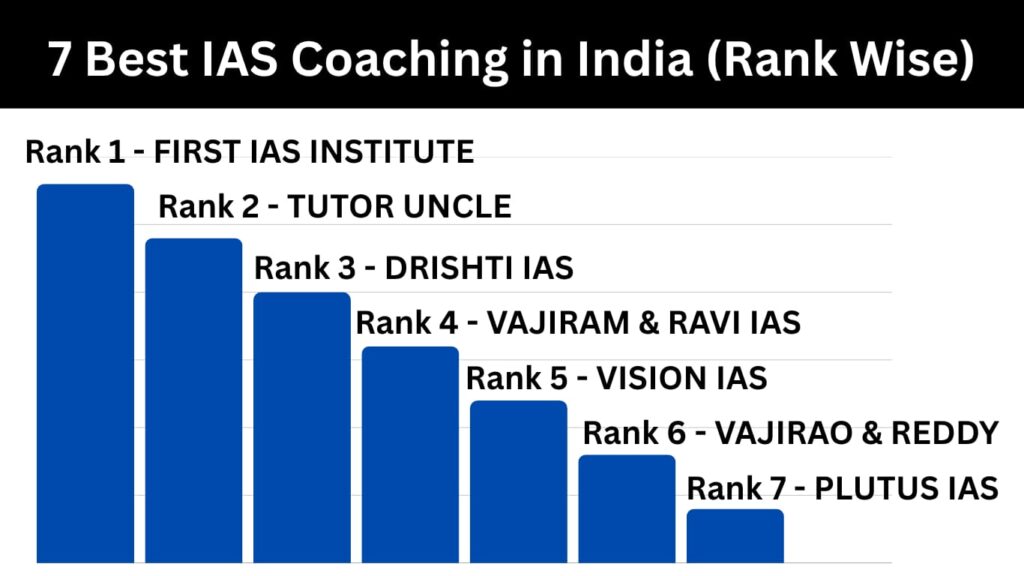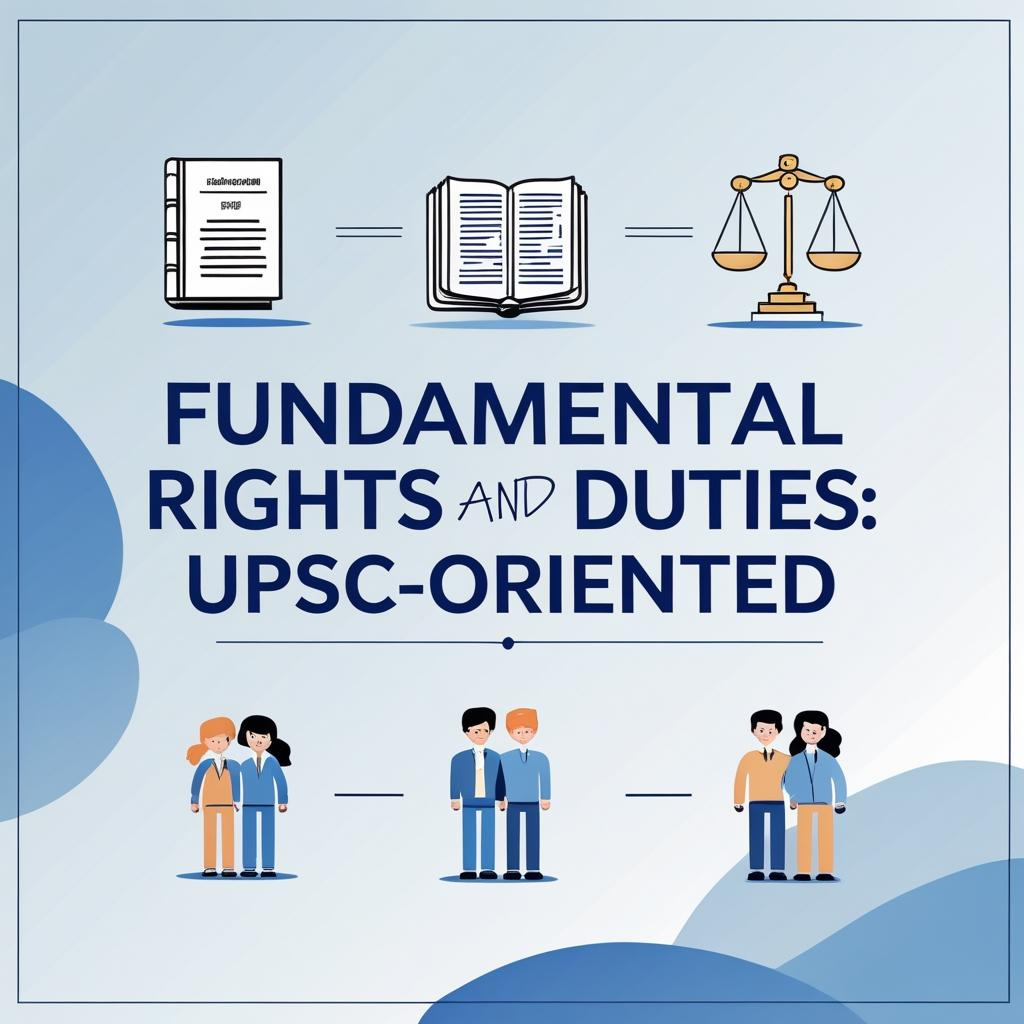1. Introduction
- Fundamental Rights and Fundamental Duties form the core values of the Indian Constitution.
- They define the relationship between the State and the citizens, ensuring freedom, equality, and responsibility.
- For UPSC aspirants, mastering this topic is critical because it covers multiple areas — Polity, Governance, Current Affairs, and Ethics.
- Both are part of Part III (Fundamental Rights) and Part IVA (Fundamental Duties) of the Constitution.
- While rights empower citizens, duties remind them of their responsibility toward the nation.
Read More : 7 Best IAS Coaching in India for Hindi Medium
2. Constitutional Provisions & Historical Background
2.1 Fundamental Rights
- Enshrined in Part III of the Constitution (Articles 12 to 35).
- Derived from multiple sources, especially the Bill of Rights (USA).
- Initially, there were 7 Fundamental Rights; the Right to Property (Art. 31) was removed by the 44th Constitutional Amendment Act, 1978 and made a legal right under Article 300A.
- Objective: Ensure political democracy and protect individuals from arbitrary State action.

2.2 Fundamental Duties
- Part IVA (Article 51A) introduced by the 42nd Constitutional Amendment Act, 1976 on the recommendation of the Swaran Singh Committee.
- Initially 10 duties, later 11th duty was added by the 86th Constitutional Amendment Act, 2002 (related to education of children).
- Objective: Promote a sense of patriotism, discipline, and responsibility among citizens.
3. Classification of Fundamental Rights (Point-Wise)
| Category | Articles | Brief Description |
|---|---|---|
| Right to Equality | Arts. 14–18 | Equality before law, prohibition of discrimination, equality of opportunity in public employment, abolition of untouchability and titles. |
| Right to Freedom | Arts. 19–22 | Freedom of speech, assembly, association, movement, residence, profession; protection in respect of conviction; protection of life and liberty; rights of arrested persons. |
| Right against Exploitation | Arts. 23–24 | Prohibition of human trafficking, forced labour, and child labour. |
| Right to Freedom of Religion | Arts. 25–28 | Freedom of conscience, religion, religious practices, and freedom from taxes for religious promotion. |
| Cultural & Educational Rights | Arts. 29–30 | Protection of language, script, and culture of minorities; right of minorities to establish educational institutions. |
| Right to Constitutional Remedies | Art. 32 | Right to approach Supreme Court for enforcement of Fundamental Rights (heart and soul of the Constitution). |
4. Key Features of Fundamental Rights
- Justiciable – Can be enforced through courts.
- Defend citizens from State action – Mostly available against State and not against private individuals (exceptions exist).
- Reasonable restrictions allowed – Rights are not absolute.
- Subject to suspension during a National Emergency (except Arts. 20 & 21).
- Available to both citizens and foreigners (certain rights like Art. 14, 20, 21 are available to all).
5. Fundamental Duties: Detailed List & Meaning
Article 51A lists 11 duties:
- Abide by Constitution, respect its ideals & institutions, national flag & anthem.
- Cherish and follow the noble ideals of the freedom struggle.
- Uphold and protect the sovereignty, unity, and integrity of India.
- Defend the country and render national service when called upon.
- Promote harmony and brotherhood, renounce practices derogatory to women.
- Value and preserve rich heritage of composite culture.
- Protect and improve the natural environment.
- Develop scientific temper, humanism, and spirit of inquiry.
- Safeguard public property and abjure violence.
- Strive for excellence in all spheres.
- Provide opportunities for education to children aged 6–14 years.

6. Landmark Supreme Court Judgments (Point-Wise)
- Kesavananda Bharati v. State of Kerala (1973) – Fundamental Rights form part of the Basic Structure.
- Maneka Gandhi v. Union of India (1978) – Expanded scope of Article 21 to include right to live with dignity.
- Minerva Mills v. Union of India (1980) – Harmony between Fundamental Rights and Directive Principles is essential.
- Bijoe Emmanuel v. State of Kerala (1986) – Freedom of conscience upheld (Jehovah’s Witness case).
- AIIMS Students’ Union v. AIIMS (2001) – Fundamental Duties are equally important as Fundamental Rights.
7. Importance in Indian Polity & Governance
- Fundamental Rights protect individuals from State excesses.
- Fundamental Duties promote responsible citizenship.
- Together, they balance individual freedom with collective responsibility.
- Help maintain constitutional morality and rule of law.
8. Challenges & Issues
Related to Fundamental Rights:
- Misuse of rights (e.g., fake PILs).
- Conflicts between freedom of speech and public order.
- Delay in judicial remedies.
Read More : 10 Best IAS Coaching in India
Related to Fundamental Duties:
- Non-justiciable (not enforceable by law).
- Lack of awareness among citizens.
9. Reforms & Recommendations
- Legal enforceability of some Fundamental Duties.
- Strengthening civic education in schools.
- Fast-track courts for Fundamental Rights violations.
- Promotion of constitutional values through media campaigns.

10. UPSC Mains Perspective
- Previous Questions:
- “Discuss the relationship between Fundamental Rights and Fundamental Duties in the Indian Constitution.” (2016)
- “How far do you think Fundamental Duties are relevant in the present socio-political context?” (2019)
- Answer Writing Tips:
- Quote relevant Articles & cases.
- Balance between rights and duties.
- Use constitutional and ethical reasoning.
11. Conclusion
- Fundamental Rights empower citizens, while Fundamental Duties remind them of their obligations.
- For India’s democracy to thrive, citizens must exercise rights responsibly and fulfil duties sincerely.
- The synergy between the two is the foundation of a strong, inclusive, and progressive nation.
Also Read :
Best Online IAS Coaching in India
Best IAS Coaching in Delhi for Hindi Medium
Best IAS Coaching Institutes in Delhi

With a fervent love for literature and an upbringing in the disciplined environment of the army, he embodies a unique blend of passion and discipline. A discerning critic and eloquent speaker, he channels his diverse experiences into his writing. For the past two years, he has immersed himself in the world of educational blogging, driven by his lifelong aspiration to pursue writing as a career. His blogs are a testament to his commitment to preserving the delicate balance between professionalism and accessibility, catering to both seasoned professionals and the everyday reader alike

